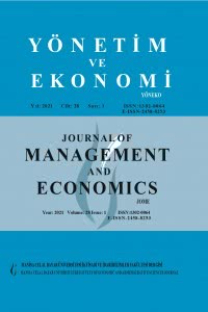İşletmeler İçin Bilgi Birikimi Yönetimi
Artan küresellesme ile birlikte, büyüyen sirketler uluslararası faaliyetlerini arttırmıslar ve dünya üzerinde birçok farklı noktada, degisik sosyo kültürel ve ekonomik unsurlara sahip ülkelerde faaliyet göstermeye baslamıslardır. Günümüzde bilgi bu isletmelerin uluslararası alanlarda basarı ile faaliyet gösterebilmeleri ve hatta varlıklarını sürdürebilmeleri için en önemli silahları olmustur. Etkin bilgi birikimi idaresi, isletmelerin ellerindeki çok degerli insan ve bilgi kaynaklarını, stratejik amaçlar dogrultusunda etkin kullanımının en önemli yoludur. Bu makalede, basarılı küresel bilgi birikimi yönetiminin temel karakteristikleri tartısılmıs, küresel bilgi birikimini destekleyen önemli örgütsel unsurlar üzerinde durulmus ve uluslararası bilgi birikimi yönetiminin sorunları ve çözümleri sınıflandırılarak sunulmustur. Ayrıca, literatürü temel alarak, isletmelere yarar saglayabilecek bir Küresel Bilgi Birikimi Yönetimi modeli gelistirilmistir.
Knoweldge Management for Organization
With increasing globalization, Multinational Organizations have enhanced their activities and started to operate in various countries with variety of socio - cultural and economical aspects. Today, knowledge has become a critical weapon for those organizations operating globally for success and even their survival. Efficient knowledge management is the most important way of organizations to successfully manage their rare human and knowledge resources. In this article, basic characteristics for successful global knowledge management have been discussed, important organizational characteristics, supporting global knowledge management have been pointed out and taxonomy of global knowledge management problems and their solutions has been presented. In addition, based on the literature, a Global Knowledge Management Model has been developed.
___
- ANONİM, (1995) Cross border Monitor, The Economist Intelligent Unit, Economist, 3 (7),February: 9 –10.
- BARTLETT, C. A., ve GHOSHAL, S. (1998) Managing across Borders: The Transnational Solution. 2nd ed. Boston: Harvard Business School Press,.
- BECERRA, I.. ve SABHERWAL, R. (2001), Organizational Knowledge Management: A Contingency Perspective, Journal of Management Information System, 18 (1), Summer 2001 : 23 – 55.
- BIRKINSHAW, J. (2001), Making Sense of Knowledge Management, Ivey Business Journal, 65(4),March 2001 : 32 – 42.
- BLUMENTRITT, R. ve JOHNSTON, R., (1999), Towards a Strategy for Knowledge Management, Technology Analysis and Strategic Management, 11(3) : 287 – 300.
- BRAND, A. (1998), Knowledge Management and Innovation at 3M, Journal of Knowledge Management, 2(1) : 17 – 22.
- BRANNBACK, M. (1997), The Knowledge-Based Marketing Concept - A basis for global business, Human Systems Management, 16 ( - ) : 293 – 299.
- CHAIT, L. (1999), Creating A Successful Knowledge Management System, Journal of Business Strategy, 20 (2) : 23 – 34.
- CLAIR, G. (2001), Knowledge Services, Information Outlook, 5 (6) : 6 – 17.
- DAVENPORT, T. ve PRUSAK, L. (1998), Working Knowledge, HBR Press, Paper Back Edition.
- DETIENNE, K. ve JACKSON, L. (2001), Knowledge Management: Understanding Theory and Developing Strategy, Competitiveness Review, 11(1) : 1 – 11.
- EARL, M. (2001), Knowledge Management Strategies: Toward a Taxonomy, Journal of Management Information Systems, 18 (1), Summer 2001 : 215 – 233.
- ELLIS, K. (2001), The Best practices. Globally, Training, July 2001 : 32 – 38.
- FORD, H. (1998), Building Intranets: The Business Case, Telecommunications, 32 (12) : 49 – 52.
- GOLD, A., MALHOTRA, A. ve SEGARS, A. (2001), Knowledge Management: An Organizational Capabilities Perspective, Journal of Management Information Systems, 18 (1) : 185 – 214.
- GROVER, V. ve DAVENPORT, T, (2001), General Perspectives on Knowledge Management, Journal of Management Information Systems, 18 (1) : 5 – 21.
- GUPTA, A. ve GOVINDARAJAN, V. (2000), Knowledge Flows Within Multinational Corporations, Strategic Management Journal, 21 ( -) : 473 – 496.
- MCFARLEN, F.W. (1994), Issues in Global Outsourcing, in P. Palvia, S. Palvia and E. Roche(eds.), Global Information Technology and Systems Management: Key Issues and Trends. Nashua, NH: Ivey League Publishing.
- MOORE, K. ve BIRKINSHAW, J. (1998), Managing Knowledge in Global ServicesFirms: Centers of Excellence, Academy of Management Executive, 12 (4) : 81 – 92.
- NEWELL, S., SCARBROUGH, H. ve SWAN, J. (2001), From Global Knowledge Management to Internal Electronic Fences, British Journal of Management, 12 ( - ) : 97 – 111.
- NIDUMOLU, S., SUBRAMANI, M. A. (2001), Situated Learning and The situated Knowledge Web, Journal of Management Information Systems, 18 (1), Summer 2001 : 115 – 150.
- ORLIKOWSKI, W. ve HOFMAN, D. (1997), An improvisational Model for Change Management:The Groupware Technologies, Sloan Management Review, Winter 1997 : 11 – 21.
- REISENBERG, J. (1998), Executive Insights: Knowledge – The source of Sustainable Competitive Advantage, Journal of International Marketing, 6 (3) : 94 – 107.
- ROBERTS, K., KOSSEK, E. ve OZEKI, C. (1998), Managing the Global Workforce: Challenges and Strategies, Academy of Management Executive, 12 (4) : 93 – 106.
- SIMON, S.J. (2002), Successful Implementation of ERP Systems for Multinationals: Using Control and Coordination Artifacts, in P. Palvia, S. Palvia and E. Roche (eds.), Global Information Technology and Electronic Commerce: Issues for the New Millennium. Marietta, GA:Ivy :League Publishing.
- STORCK, J. ve HILL, P. (2000), Knowledge Diffusion Through Strategic Communities, Sloan Management Review, 41 (2), Winter 2000 : 63 – 74.
- The Economist Intelligence Unit Limited (1998), The Economist Special Report, Economist,December 16th, 1998 : 4 – 5.
- TIWANA, A. ve RAMESH, B. (2001), A Design Knowledge Management to Support Collaborative Information Product Evolution, Decision Support Systems, 31 ( - ): 241 – 262.
- ISSN: 1302-0064
- Yayın Aralığı: Yılda 4 Sayı
- Yayıncı: Manisa Celal Bayar Üniversitesi İktisadi ve İdari Bilimler Fakültesi
Sayıdaki Diğer Makaleler
"Örgütsel Cinsiyetlerin Örgütsel Davranışa Yansıması"
Ayşen TEMEL, Mehmet YAKIN, Sema MİSCİ
Yabancı Sermaye Yatırımlarının Verimlilik ve Kalkınmaya Etkilerinin Ekonometrik İncelemesi
Serap ÜRÜT, Ercan BALDEMİR, Y. Yüksel AYVAZ
" “İş Ahlakı” Cinsiyetler Arasındaki Farklılıklar Açısından Literatür İncelemesi"
"Halka Açık Olmayan Şirketlerde Sistematik Risk Ölçütü Beta Katsayısının Tahmin Edilmesi"
"Ahlaki Liderliğin Kavramsallaştırılması ve Ahlaki Yönetimde Liderliğin Rolü"
